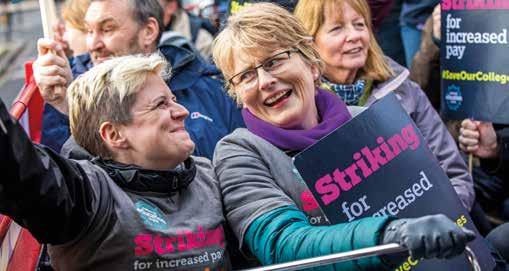
3 minute read
Michael Rosen
September
Way back in September when the weather was sunny and bright, we thought it would be fairly easy for the Government to get it right.
Surely they could easily predict without being clever or wise that schools would have to close as Covid infections would rise?
So would they be able to deduce that pupils would spend more hours having to study at home? Was that beyond the Government’s powers? Yet it seems to have been impossible to solve a problem quite so mighty or they would have made really sure that ALL pupils had the right IT.
It’s hard to avoid the conclusion that they were indeed aware but as they didn’t do the job they’re a Government that doesn’t care.
Words by Michael Rosen Illustration by Dan Berry
LGBT+ conference has always been a source of inspiration, connection and, above all else, liberation.
Without the time, space and facilities to meet face-to-face with members from across the regions and nations, our activists kept the same momentum for change. Our very first entirely online conference was a triumph and allowed hundreds of educators to develop and champion the necessary work done by the union.
It was an inclusive source of hope for queer educators in one of the worst years we have ever seen. Conference virtual spaces were named in tribute to present leaders of the movement Annette Pryce and Chay Brown, and the sorely missed Manoj Natha-Hansen and Tony Fenwick.
Workshops and discussions included: n an international plenary to share diverse pedagogical work from across Europe and the US n the trans and non-binary network to enable inclusion for all n intersectional workshop led by Kuchenga with the Black educators and northern network to empower educators to make real immediate change to dismantle oppression.
The motion debates championed the ongoing fight for the rights of our trans and non-binary members and students.
It was an honour to support and after that Saturday I walked a little taller. After all: “If you’re not at the table then you’re on the menu.”
Victoria Cleary-Symonds

Pay rise for sixth form teachers

NEU sixth form college strikers assembled in Parliament Square in February last year PHOTO by Jess Hurd
SIXTH FORM teachers have been offered a 3.25 per cent pay rise from May.
The NEU executive is recommending members accept the offer, which will close the gap between sixth form and school teachers’ pay.
Most teachers in sixth forms are employed on point 9 and will earn £128 more than those on U3 in schools.
In further education (FE) colleges, unions have rejected a one per cent increase for 2020/21 put forward by the Association of Colleges (AoC), arguing it will anger staff who are already paid significantly less than their counterparts in schools.
Unions are now in talks with the AoC to look at the possibility of introducing a £30,000 a year starting salary in FE to match the Government commitment to schools.
Union recognition at John Whitgift Foundation
HUNDREDS of independent sector teachers employed at the John Whitgift Foundation in Croydon, south London, have won union recognition.
The 400 teachers at the foundation’s three schools – Whitgift, Trinity and Old Palace – voted in favour of recognition after noting attacks on the Teachers’ Pension Scheme at other schools in the sector.
NEU rep Lee Flanagan, who coordinated the campaign, said: “We are pleased to have reached amicable accord with the John Whitgift Foundation to strengthen teachers’ collective voice in discussions on pay, terms and conditions. We speak for teachers but believe that the resulting decisions will also be better for schools. We look forward to constructive but robust discussion.”
Ninety-three per cent of teachers voted in favour, on a turnout of 75 per cent. NEU workplace reps will now negotiate teachers’ terms and conditions.
John Richardson, NEU national officer for the independent sector, who led the talks, said: “I would like to commend the leadership of our school reps, Lee Flanagan at Trinity, Oliver Roberts at Whitgift and Helen Richards at Old Palace. Undoubtedly, they have ensured that their colleagues will have a greater influence in the decisions that affect their daily working lives.”










